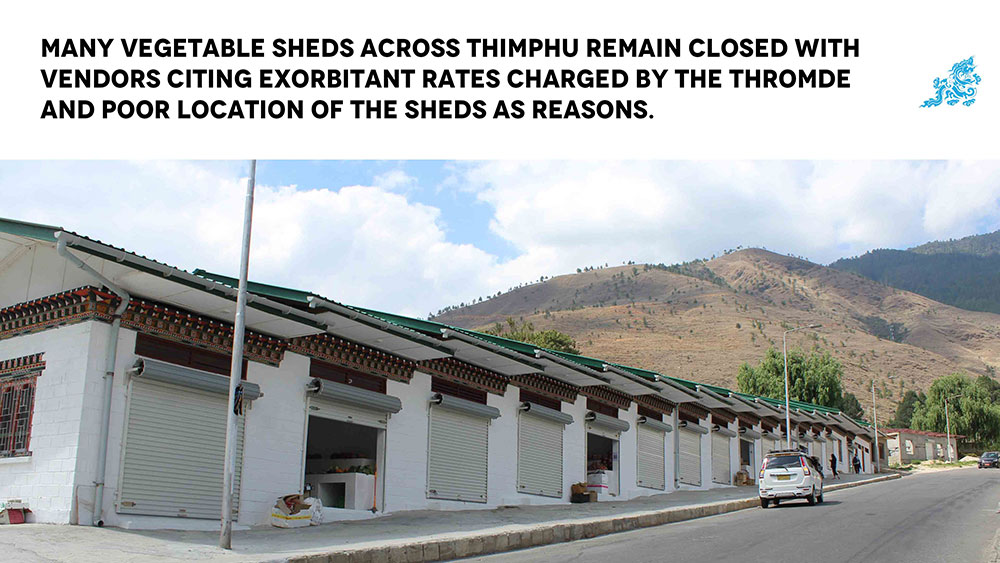Weeks after opening vegetable sheds across different zones within the Thimphu Thromde to business, most of the stalls remain closed and the few vendors selling from the sheds want to move out too.
This, according to the vendors, is because they couldn’t afford the exorbitant rates charged by the thromde. Poor location of the vegetable sheds added to the problem. There were no takers for the products.
Last year, in a move to decongest Centenary Farmers’ Market (CFM), the thromde announced that all the vendors operating at CFM would have to move out to designated vegetable markets in various zones across the thromde.
A vendor, Tendel Zangmo, who had been selling vegetables at the Changjalu vegetable shed for three weeks, said that she could not make even Nu 1,000 from the sales. “There are no buyers. Some come in the evening to shop but there are no parking areas. It causes inconvenience and they leave.”
Despite poor business, she pays Nu 7,300 a month as rent. Without buyers, most of her vegetables rot. “We won’t be able to pay rent. If the situation doesn’t improve, I’ll vacate.”
“They don’t have to hike rent from the beginning; it could be done after business picks up. We can pay about Nu 3,000. More than 7,000 is beyond our means,” she said.
Her income while selling vegetables at the CFM was about Nu 3,000 a day and made about Nu 8,000 on weekends. At the current location, even on weekends, she barely earned Nu 2,000. “There is also competition from vendors in Olakha and grocery shops are also allowed to sell fruits and vegetables.”
Out of 12 stalls at Changjalu, only five are occupied. Vendors plan to leave soon if the business doesn’t pick up.
Earlier this year, CFM announced that 87 out of about 500 vendors at the CFM decided to sell from vegetable markets in different zones but if the situation remains as it is, it is unlikely that vendors would move.
A vendor, Choining Wangmo, said that she paid Nu 2,400 as rent at the CFM. “We sell vegetables at the same price as that of CFM but have to pay extra money to transport fruits and vegetables from CFM. Many vendors cancelled because they couldn’t afford.”
The situation is worse at Changbangdu. Located in an isolated area, most of the 14 stalls remain closed. The rent is higher there too.
A vendor, Sonam Yuden, pays Nu 7,900 as rent. She said that in three days, not a single buyer came. “There are only a few households, and most have kitchen gardens.”
The single mother said, “I have three kids. We won’t be able to survive. It’s adding up to my expenses since I’ve to pay house rent too.”
She said the thromde could delay rent collection by a few months.
The rent varies across zones. Some pay Nu 4,000.
Thimphu Thrompon Ugyen Dorji said that while creating urban villages with facilities and services in different zones was in the plan since the 2000s, implementation was a failure.
He said that identifying locations for vegetable sheds within zones were carried out in a rush without consulting planners. “There were several factors that needed to be considered, such as traffic, population density, and nodal points but the decision was poorly implemented without proper research and study. Congestion will be the biggest problem without parking areas in these areas.”
“It would have been efficient and would have benefitted people if proper studies were carried out before implementing the plan,” he said, adding that non-functional vegetable sheds are going to be another problem in the city.
He said that forcing vendors out of CFM and relocating them in poorly identified sheds wouldn’t help. “They’re unwilling to move out as they know that the business will fail because of the location.”
For example, he said that the shed in Changbangdu had only a few settlements nearby. “It was not feasible. It is bound to fail without any customers.”
He said that the thromde would look into rent hikes and ensure that infrastructure in different zones are not wasted.
By Choki Wangmo
Edited by Jigme Wangchuk


